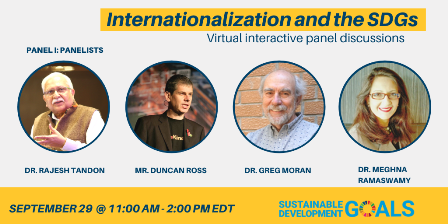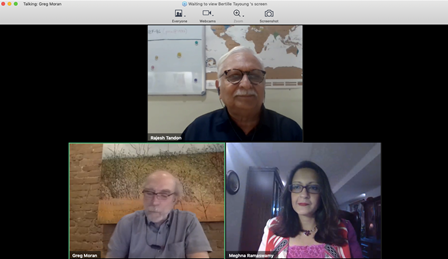Date/Time
Date(s) - 29/09/2020
11:00 am - 2:00 pm
Categories No Categories

International Relations Professional Learning Community (IR-PLC), Canadian Bureau for International Education hosted a virtual interactive panel discussion on ‘Internationalization And The Sustainable Development Goals’ on September 29th, 2020.
The coronavirus (Covid-19) pandemic has exposed huge inequalities – which have always existed – both between and within countries, and at the same time, has opened a deeper discussion on the role universities play in contributing to the implementation of the UN 2030 Agenda. This pandemic has shown that addressing global challenges requires universities to use creative and innovative approaches in a collective manner. The Sustainable Development Goals (SDGs) can serve as a set of guiding principles that guide universities in translating their core values and aspirations into measurable, sustainable impacts, leading to more equitable outcomes. This approach would allow universities to embed our practices within a humanitarian context. The panel discussion addressed this idea of globalising these SDGs in higher education institutions and the potential initiatives to strengthen links between universities on international cooperation and the SDGs.
Our Chair, Dr. Rajesh Tandon (Founder-President, Society for Participatory Research in Asia), moderated Panel 1 on the theme ‘Strategies in Internationalizing the SDGs in Higher Education Institutions’.

Within the current context of Covid- 19, we all have a role to play in achieving the Sustainable Development Goals. In order to achieve them, it is imperative that local problems are brought together to create a global conversation for a shared purpose. We need to think about how and what kind of knowledge cultures serve the interest of societal improvement. Policy makers must think of ways in which local knowledge and local solutions can be harvested and shared globally. The idea is to produce and collect knowledge locally, but making the sharing methodology global in nature.
Dr. Greg Moran started the panel discussion by proposing that the debate about whether SDGs are useful or not is futile; what is important is how we can use the SDGs to structure and direct our work to find solutions. SDGs cannot be achieved within borders; international research opportunities, student mobility across borders and cross-border development projects can help us find real solutions to the challenges confronting the world. A renewed approach towards the role of higher education institutions is necessary to understand what they can do to support global development. Universities serve as the most powerful vehicles to promote solution-oriented actions by strengthening their capacities to address local problems.
Dr. Meghna Ramaswamy suggested that SDGs serve as a moral compass to remind us of the world that we want to build for the future generation. Current trajectories of development are unsustainable economically, socially and politically. International research can serve a critical role not only to create awareness but to be at the forefront to find innovate and sustainable solutions. We need to find ways to help researchers think beyond their own research projects through critical self- reflection and reconceptualization of the society they live in. It is no use translating ambition into action if your action does not translate into impact.
Mr. Duncan Ross spoke of how data is now being gathered for universities on an index of impact using SDGs as an overarching framework. They serve not only as a useful tool to assess traditional green elements but also look at equality. They see an intersectionality between equity at a global and individual level along side sustainability in the traditional self.
On the question of role of universities to liaise with Governments, panelists shared that often universities have to be bolder since they play a public intellectual function. By simply producing evidence, change wont happen. In terms of dealing with barriers within universities, it was opined that there is a need to reconceptualise the mission of universities. It was also suggested that universities can protect themselves by demonstrating the value of the work they are doing which is necessary to protect society and find solutions for global challenges facing humanity.
To learn more about the conference: https://cbie.ca/event/internationalization-and-the-sdgs/




